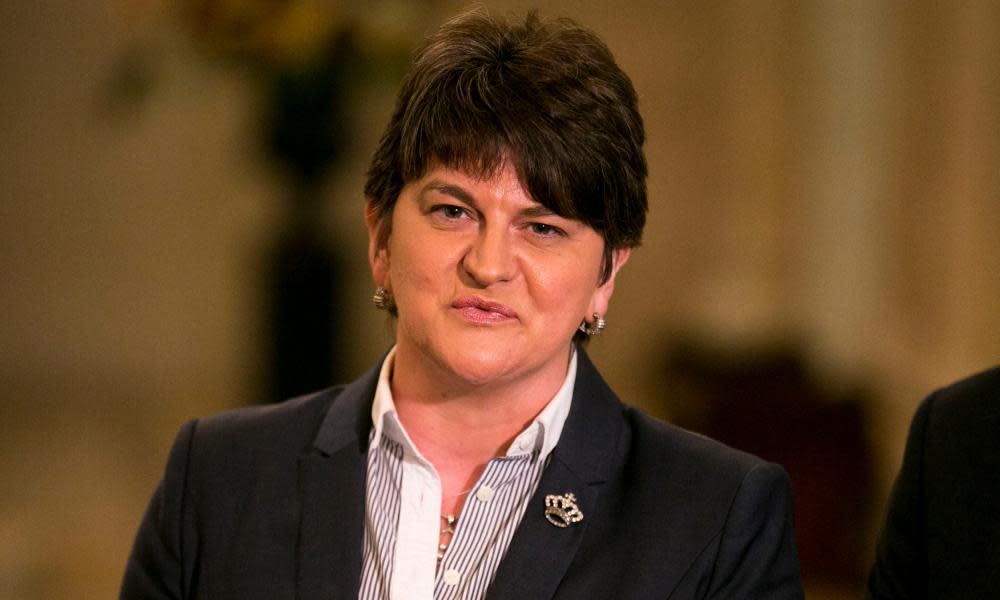DUP hits out at Brussels and Dublin over Brexit 'blackmail'

The Democratic Unionist party has launched a scathing attack on Brussels and Dublin politicians accusing them of trying to use Northern Ireland to “blackmail” Brexit negotiators in London.
Arlene Foster, the party’s leader, issued a strongly worded statement on Monday night, three days after Ireland’s taoiseach warned that the country would block progress in Brexit talks unless the UK came up with proposals to avoid a hard border with Northern Ireland.
But Foster hit back, saying Brussels and Dublin were “wrecklessly trying to use Northern Ireland for their own objectives”.
She acknowledged that external parties had a role in bringing peace to the region, where life was blighted by bloodshed during the 30 years of the Troubles, but said it was “downright careless” to suggest Brexit would bring a return to violence.
“The people of Northern Ireland delivered peace and stability,” Foster said. “Yes, they were supported beyond these shores, but to suggest that exiting the EU will bring violence onto our streets is downright careless.
“Those in Dublin and Brussels, wrecklessly trying to use Northern Ireland for their own objectives, should cease. The prime minister should warn Brussels that Northern Ireland must not be used as blackmail.”
She and her deputy Nigel Dodds will meet Theresa May on Tuesday to talk about Brexit and the restoration of power-sharing in the region, which has been without an assembly since January.
The DUP has opposed calls by Sinn Féin, Ireland and the EU for Northern Ireland to remain in the EU customs union and single market as a way of achieving an invisible border with Ireland.
The party’s position could amount to another roadblock in Brexit negotiations. Its view will be of critical importance to any new Brexit proposals by May on Northern Ireland, as it is propping up the Tory minority government after striking a £1bn confidence supply deal after the general election.
Meanwhile, MPs were told on Monday that senior civil servants had few contingency plans for managing the Northern Irish border after Brexit because of a political stalemate between London and Dublin.
Mandarins questioned about preparations for the UK’s borders by the public accounts committee said they could not draw up scenarios until ministers have moved forward.
Appearing before the parliamentary spending watchdog on Monday, HMRC officials were asked how they would monitor the movement of goods and services at 300 crossing points along the border.
Karen Wheeler, HMRC’s director general, said: “That area is not within the scope that we have been working on in the border planning group because the arrangements on Ireland are still subject to negotiations and ministerial discussions.”
Ireland’s new taoiseach, Leo Varadkar, has been much more sceptical than the UK about the potential for avoiding border posts via virtual checks on importers. Whilst agreeing with British ministers and EU negotiators that it is inconceivable for there to be a return to a hard border with the north, Dublin argues that the best way for the UK to achieve this would be by permanently remaining in a customs union with the EU and seeking single market membership like Norway through the European Economic Area. The UK has conceded that some of this will be necessary in its interim phase after Brexit, but hopes clever technological solutions can allow it have looser economic links in the long run. Varadkar is not alone in being sceptical about whether such a cake-and-eat-it customs and trade strategy is viable.
Jon Thompson, HMRC’s chief executive, added: “We need the process to go a bit further forward before we can fully understand it.”
Meg Hillier, the committee chair, asked when they would be able to draw up different scenarios when there was such a “fuzzy plan” around the border.
Thompson said that the government wanted no additional infrastructure or a hard border in Northern Ireland, but added: “We are unable to go any further on that because of the political process.”
Clare Moriarty, Defra’s permanent secretary, reinforced Thompson’s assessment, adding that government officials could not pre-empt any deal.
Despite British assertions that there will be no hard border, Dublin has criticised the UK’s position, saying that position is hard to guarantee when the UK is leaving the customs union and the single market. Dublin also doubts a two-year transitional deal for business to adjust to Brexit is long enough.
MPs on the committee grew exasperated with what appeared to be a lack of planning from government departments for future border arrangements.
Conservative member Geoffrey Clifton-Brown asked Wheeler why her department had few additional contingency plans for delays at “roll on, roll off” ports such as Dover, when additional two-minute delays could quickly lead to 17-mile tail backs.
Wheeler said the department was working on the assumption that the UK would not be introducing that type of delay. Clifton-Brown replied that they may have to introduce additional lorry parks: “You may not be able to avoid it ... Isn’t this something you need to address now?”
Sir Amyas Morse, the head of the National Audit Office, asked how long HMRC would have to rely upon such an assumption before finding the capacity to introduce contingency measures.
Wheeler replied: “I don’t have an answer for how long that situation will last for because there will be a number of things that will have to happen.”

 Yahoo News
Yahoo News 
